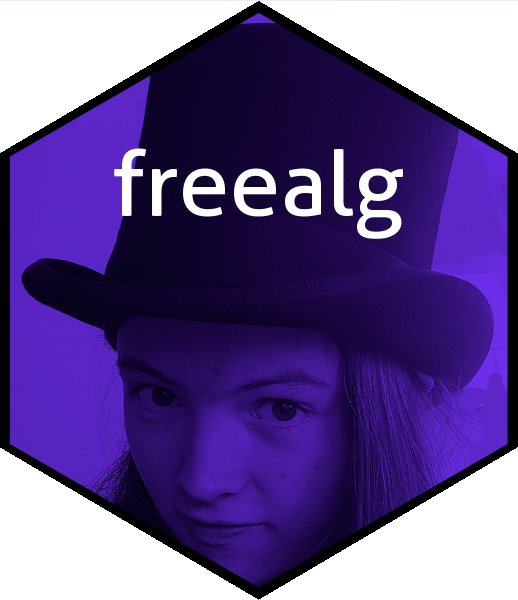
The hardware and bandwidth for this mirror is donated by METANET, the Webhosting and Full Service-Cloud Provider.
If you wish to report a bug, or if you are interested in having us mirror your free-software or open-source project, please feel free to contact us at mirror[@]metanet.ch.

The free algebra is an interesting and useful object. Here I present
the freealg package which provides some functionality for
free algebra in the R programming environment. The package uses the
C++ map class for efficiency and conforms to
disordR discipline. Several use-cases are provided.
You can install the released version of freealg from CRAN with:
# install.packages("freealg") # uncomment this to install the package
library("freealg")The free algebra is the free R-module with a basis consisting of all words over an alphabet of symbols with multiplication of words defined as concatenation. Thus, with an alphabet of and
and
we would have
and
A natural and easily implemented extension is to use upper-case symbols to represent multiplicative inverses of the lower-case equivalents (formally we would use the presentation ). Thus if
we would have
and
The system inherits associativity from associativity of concatenation, and distributivity is assumed, but it is not commutative.
freealg package in
useCreating a free algebra object is straightforward. We can coerce from a character string with natural idiom:
X <- as.freealg("1 + 3a + 5b + 5abba")
X
#> free algebra element algebraically equal to
#> + 1 + 3*a + 5*abba + 5*bor use a more formal method:
freealg(sapply(1:5,seq_len),1:5)
#> free algebra element algebraically equal to
#> + a + 2*ab + 3*abc + 4*abcd + 5*abcdeY <- as.freealg("6 - 4a +2aaab")
X+Y
#> free algebra element algebraically equal to
#> + 7 - a + 2*aaab + 5*abba + 5*b
X*Y
#> free algebra element algebraically equal to
#> + 6 + 14*a - 12*aa + 6*aaaab + 2*aaab + 30*abba - 20*abbaa + 10*abbaaaab + 30*b
#> - 20*ba + 10*baaab
X^2
#> free algebra element algebraically equal to
#> + 1 + 6*a + 9*aa + 15*aabba + 15*ab + 10*abba + 15*abbaa + 25*abbaabba +
#> 25*abbab + 10*b + 15*ba + 25*babba + 25*bbWe can demonstrate associativity (which is non-trivial):
set.seed(0)
(x1 <- rfalg(inc=TRUE))
#> free algebra element algebraically equal to
#> + 7*C + 6*Ca + 4*B + 3*BC + a + 5*aCBB + 2*bc
(x2 <- rfalg(inc=TRUE))
#> free algebra element algebraically equal to
#> + 6 + CAAA + 2*Ca + 3*Cbcb + 7*aaCA + 4*b + 5*c
(x3 <- rfalg(inc=TRUE))
#> free algebra element algebraically equal to
#> + 3*C + 5*CbAc + BACB + 2*a + 10*b + 7*cb(function rfalg() generates random freealg
objects). Then
x1*(x2*x3) == (x1*x2)*x3
#> [1] TRUEFor more detail, see the package vignette
vignette("freealg")
These binaries (installable software) and packages are in development.
They may not be fully stable and should be used with caution. We make no claims about them.